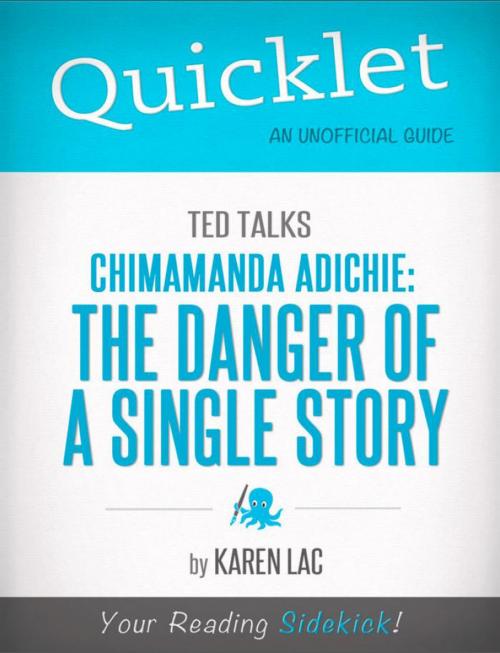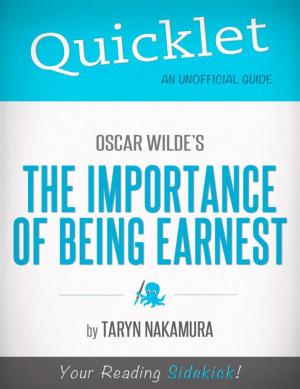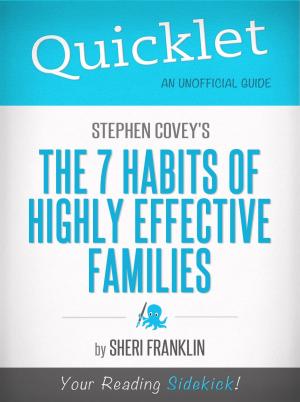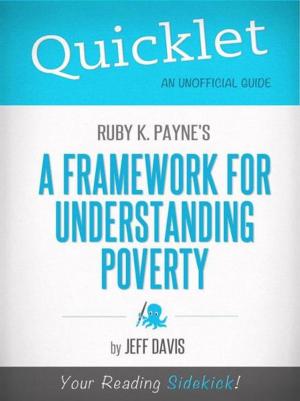Quicklet on TED Talks: Chimamanda Adichie: The danger of a single story (CliffNotes-like Summary)
Nonfiction, Reference & Language, Study Aids, Book Notes, Art & Architecture, General Art| Author: | Karen Lac | ISBN: | 9781614649687 |
| Publisher: | Hyperink | Publication: | February 24, 2012 |
| Imprint: | Hyperink | Language: | English |
| Author: | Karen Lac |
| ISBN: | 9781614649687 |
| Publisher: | Hyperink |
| Publication: | February 24, 2012 |
| Imprint: | Hyperink |
| Language: | English |
ABOUT THE BOOK
At first glance, it would not seem that I, someone who was born in the United States and has never been to Africa, would have anything in common with a woman from Nigeria. My exposure to Nigeria is so limited that I am largely unable to distinguish it from the rest of the continent, as if there is a singular African culture and experience.
Like many Americans, what I know of Africa largely comes from the news media. This means that when I think of Africa, I usually think of wars, refugee camps, abject poverty, diseases, and corruption. With the exception of having beautiful wildlife and landscape, Africa to me simply represented a place of general misery.
This is the result of being exposed to only a single story. As Nigerian writer Chimamanda Adichie points out in her TED talk, “The danger of a single story,” there is never a single story. Her own life is a testament to the fact that Africa is not just what we see on the news.
MEET THE AUTHOR
Based in the San Francisco Bay Area, Karen Lac has been writing since 1999. Her articles have appeared in print in “The Occidental Weekly.” Her writing reflects her broad interests. She writes travel, entertainment, political commentary, health, nutrition, food, education, career, and legal articles for numerous websites. She holds a Bachelor of Arts in English Literature and a Bachelor of Arts in politics, both from Occidental College.
EXCERPT FROM THE BOOK
Nigerian writer Chimamanda Adichie uses her personal life and experiences to illustrate the danger of reducing other people and cultures to a single story rather than recognizing that we all have overlapping, multiple stories. She begins her talk by discussing her childhood in Nigeria, moves on to her experience as an African woman in the U.S., and then discusses the Nigerian experience today.
As a child growing up in a university campus in eastern Nigeria, Adichie loved reading and writing. When she began writing at the age of seven, she wrote the kind of stories that she had read. This meant that she wrote stories about blue-eyed white children who played in the snow and ate apples.
Since the only books she read were British and American books populated with people different from her who experienced things she didn’t know anything about, Adichie started believing that she had no place in books. This changed when she discovered African writers such as Chinua Achebe and Camara Laye. She realized that books could also tell the stories of people like her.
Buy a copy to keep reading!
ABOUT THE BOOK
At first glance, it would not seem that I, someone who was born in the United States and has never been to Africa, would have anything in common with a woman from Nigeria. My exposure to Nigeria is so limited that I am largely unable to distinguish it from the rest of the continent, as if there is a singular African culture and experience.
Like many Americans, what I know of Africa largely comes from the news media. This means that when I think of Africa, I usually think of wars, refugee camps, abject poverty, diseases, and corruption. With the exception of having beautiful wildlife and landscape, Africa to me simply represented a place of general misery.
This is the result of being exposed to only a single story. As Nigerian writer Chimamanda Adichie points out in her TED talk, “The danger of a single story,” there is never a single story. Her own life is a testament to the fact that Africa is not just what we see on the news.
MEET THE AUTHOR
Based in the San Francisco Bay Area, Karen Lac has been writing since 1999. Her articles have appeared in print in “The Occidental Weekly.” Her writing reflects her broad interests. She writes travel, entertainment, political commentary, health, nutrition, food, education, career, and legal articles for numerous websites. She holds a Bachelor of Arts in English Literature and a Bachelor of Arts in politics, both from Occidental College.
EXCERPT FROM THE BOOK
Nigerian writer Chimamanda Adichie uses her personal life and experiences to illustrate the danger of reducing other people and cultures to a single story rather than recognizing that we all have overlapping, multiple stories. She begins her talk by discussing her childhood in Nigeria, moves on to her experience as an African woman in the U.S., and then discusses the Nigerian experience today.
As a child growing up in a university campus in eastern Nigeria, Adichie loved reading and writing. When she began writing at the age of seven, she wrote the kind of stories that she had read. This meant that she wrote stories about blue-eyed white children who played in the snow and ate apples.
Since the only books she read were British and American books populated with people different from her who experienced things she didn’t know anything about, Adichie started believing that she had no place in books. This changed when she discovered African writers such as Chinua Achebe and Camara Laye. She realized that books could also tell the stories of people like her.
Buy a copy to keep reading!















